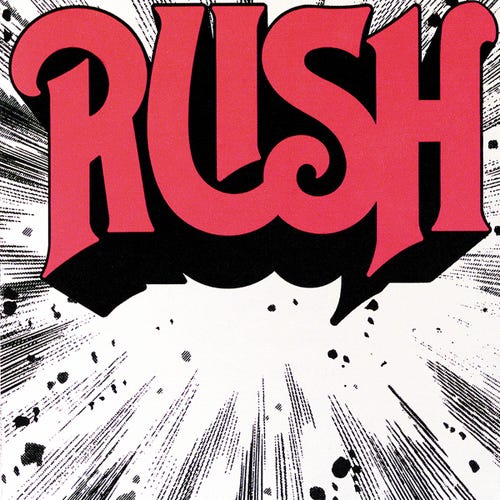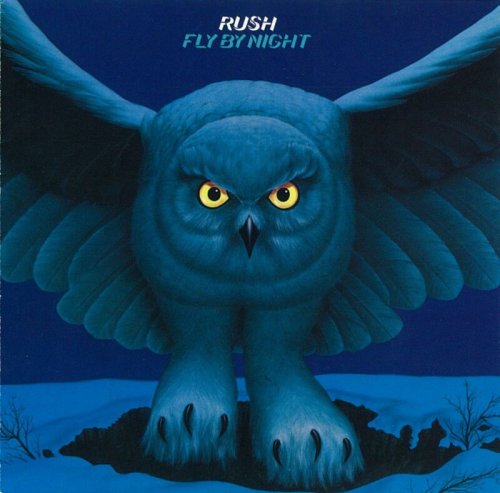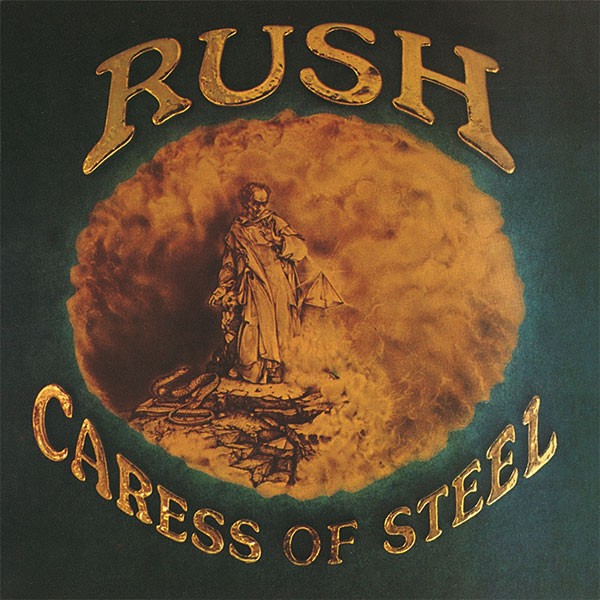The Early Years/Series Introduction (1968-1975)
The Prog/Golden Era (1976-1981)
The Synth Era (1982-1987)
The Bronze Age (1988-2000)
The Final Years (2002-2015)
In addition to this, I will review and rate every album on an F to A+ scale, like how you would grade a test or a paper.
The reason why I'm covering all of this in parts is because Rush has a vast discography with many different styles. Here's a picture I made for getting into Rush to give you an idea of how long it will take to finish their discography: https://docs.google.com/document/d/1XBgfYtzTujkBi-BT8LKs2kkhL0SSWRPyJNFrsPNM_48/edit?usp=sharing
Yeah, you can tell now, right (I would change it again to be honest)?
It's a lot of ground to cover, and luckily this is one of the less complicated ones. This will basically cover the basic history of Rush and their first three albums, those being the self-titled, Fly By Night, and Caress Of Steel. Don't expect these series to be quick, as I have to focus on personal manners, other posts, and the like. With that said, let's start with the early years, shall we?
Album 1: RUSH
As for the album itself, it's good. It's not one of the band's best releases, but it is a fun listen for sure. It doesn't quite feel like what we now know as Rush, but as a debut album, it's quite solid. Alex Lifeson's guitar work is the strongest thing on this record, with great riff after great riff, like on some of the more energetic cuts that stand out, like the iconic Working Man, the opener Finding My Way, and the fast-paced Need Some Love. While those moments are great and are some of Rush's strongest early material, there are not many highlights here. There's no awful songs, but most of them are just good. Not great, but solid. The problem comes with the fact that this is not Rush as we know them yet. This is very derivative of Led Zeppelin and similar bands from that era, and not that distinctive prog we know today. The more complicated and rhythmic structures are almost absent, and when they are there, they lack that flair we know from Rush today. They're still well performed and fun, however, which is what keeps this album in the good range; It's really fun. It may lack you-know-who's drumming and Geddy Lee's top notch bass lines, but the simplicity works and it shows for potential for this band to become something special, which they did eventually do. Overall, this album get a B. Not the most essential listen in Rush's catalog and honestly one of their weaker releases, but it's an earnest effort that I enjoy coming back to every once in a while.
Album 2: Fly By Night
Immediately from the first 30 seconds of opener Anthem, you can tell someone with a crazy amount of talent is behind the kit. The drumming is so precise and almost breathtaking on this track and throughout the entire record that it steals the whole album. This allowed for Rush to experiment with more complex composition, shown on the previously mentioned Anthem and Rush's first dive into prog with By-Tor And The Snow Dog, which both crush and remain two of my favorite Rush songs. This is still a very Led Zeppelin inspired record, but Rush started to find their identity here, and while they weren't quite there yet, their effort to stand out is commendable and you can tell they are trying to do so, and the tunes are solid as well. The iconic title track is a great blues/hard rock jam, Rivendell is a very glossy and gorgeous depiction of the Lord of the Ring location of the same name, and the rest of the tracks are solid to. My main problem with this record comes from that their are still those songs that are merely good, but not quite classics. Best I Can, for example, is a fun track, but that's about where it ends with me. The tracks that do rock are absolutely great though, and show Rush moving in a very promising direction that is stronger than their debut. I'll give this album a B+. A very good effort that has a couple of forgettable moments, but more than enough good to make up for it. Definitely recommended. While it isn't one of their best efforts, it's more of their most essential and it's still very good.
Album 3: Caress of Steel
Well, this album is... Complicated. Let's start start from the beginning. The opening track Bastille Day honestly might be my favorite early Rush song. There's so much energy here and the guitar work from Alex Lifeson is absolutely stellar, as is the work from everyone else. This is one I immediately think of when I think the best of early Rush, and if you were to only listen to one track from this record, it would be this one. I Think I'm Going Bald is undeniably goofy, but the band feels like they're having fun and I enjoy listening to it, so this one's also a thumbs up in my eyes. Lakeside Park is a decent cut, albeit not as revisitable as the first two. It definitely slows things down, but it still has a good personality and it's still good, but not a standout moment.
Now, the final two tracks really get under my skin, but not because they're the worst things ever; It's because could've been two of the best Rush tracks ever. The Necromancer has some extraordinary composition moments that are really impressive, as does The Fountain of Lamneth. Each band member gets some great moments. Geddy Lee has some great bass lines throughout, Neil Peart gets a stunning drum solo near the beginning of Fountain, and Alex Lifeson get a minute-and-a-half of pure shredding on The Necromancer that's some of his finest work. So, why don't these work for me? Because they're some of the most tonally uneven tunes I've ever heard. They clearly weren't ready for the longer compositions just yet, and the transitions and styles and tonal shifts do not work and make for a grueling experience while listening. The great moments sometimes shine through, but not when it's so hard to get invested in a song when it's so poorly paced and not well thought out.
These lyrically aren't too interesting either. The Necromancer brings back the By-Tor character from By-Tor to fight the villain, the Necromancer. A lot of it is spoken word and uninteresting, especially compared to what would come for Neil Peart's lyric writing, and when Geddy Lee does come in it doesn't really elevate the track either. The Fountain of Lamneth is about a man trying to find a sort-of fountain of youth, but realizing it's just a myth. This had so much potential, but it just falls short. It could have been poignant and emotional, but it comes off as too wordy and complex for its own good.
My relationship with this album is very complicated. There's so much good about it, but much of it feels underbaked. This transition from Fly By Night is like instead of going to the beach and stepping in the water one step at a time, then you hit a drop off and you can't swim. The first three tracks makes for a good EP, but combined with the longer tracks for an LP... It has its highlights overall, but I'm mixed on it. I'll give this record a B- for its first three tracks and the moments of brilliance on the last two, but they really bring the score down.
So at this point career wise, Rush is in a terrible state; Their new album bombed in every way possible, the tour's not doing well, and the record is pressuring them into making an album more like Fly by Night in hopes of their career getting better. However, Rush would do something different, and become the Rush we know today. I will talk about my favorite album of all time and many others on the next part.



No comments:
Post a Comment